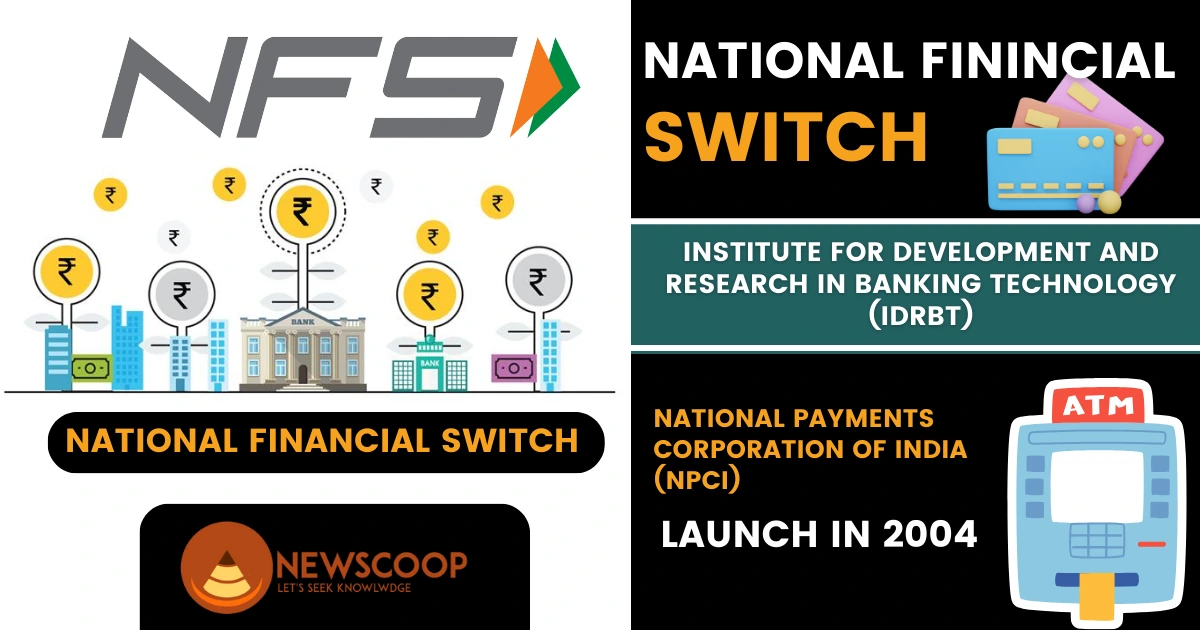National Financial Switch (NFS): Functions
The National Financial Switch (NFS) is a critical component of India’s financial infrastructure that plays a pivotal role in facilitating electronic payments.
This article aims to provide a detailed overview of the National Financial Switch (NFS), its functions, significance, and its role in the Indian economy.
| Aspect | Details |
|---|---|
| Launch Year | 2004 |
| Managing Authority | Institute for Development and Research in Banking Technology (IDRBT) |
| Initiator | National Payments Corporation of India (NPCI) |
| Primary Function | Facilitating interoperable cash withdrawal and deposit transactions at ATMs across India |
| Security Measures | Encryption, authentication mechanisms, continuous monitoring |
| Member Banks | Various banks across India |
| Interoperability | Allows customers of one bank to use the ATMs of other banks within the network |
| Real-time Processing | Enables prompt completion of transactions |
What is the National Financial Switch (NFS)?
The National Financial Switch (NFS) is a centralized payment system in India that allows interoperable cash withdrawal and deposit transactions at Automated Teller Machines (ATMs) across the country. Managed by the Institute for Development and Research in Banking Technology (IDRBT), it enables seamless transactions between various banks, irrespective of whether they are members of the NFS or not.
Practical Example of NFS
Let’s understand the National Financial Switch (NFS) with an example:
Consider a customer named Raj, who holds an account with Axis Bank. One day, he needs to withdraw cash from an ATM. The nearest available ATM is operated by SBI Bank.
Raj approaches the ATM, inserts his card, and initiates a cash withdrawal. The ATM, recognizing his card, sends a request to the NFS network. NFS, acting as a mediator, checks that Raj’s card belongs to Axis Bank.
The request is then forwarded to Axis Bank, where the system verifies Raj’s account details and ensures he has sufficient funds for the withdrawal. Once confirmed, Axis Bank approves the transaction and sends a message back to NFS.
NFS, in turn, relays this approval to the ATM of SBI Bank. The ATM, having received the authorization, dispenses the requested cash to Raj.
In this example, the NFS network facilitates Raj’s transaction seamlessly. Despite using an ATM of SBI Bank, Raj is able to access his account with Axis Bank, showcasing the interoperability feature of NFS.
Furthermore, the transaction is secure and efficient. NFS ensures that the process is carried out in real time, providing Raj with his cash promptly. This example exemplifies how NFS streamlines ATM transactions, making it convenient for customers and reducing transaction costs for both banks and users.
Evolution of NFS
The NFS was launched in 2004 by the National Payments Corporation of India (NPCI), an umbrella organization for all retail payment systems in India. It was conceived to bring together the multitude of ATMs under a single network, thereby reducing transaction costs and enhancing accessibility.
Functions of National Financial Switch
The functions of the National Financial Switch (NFS) are as follows:
- Interoperability: NFS ensures that customers of one bank can use the ATMs of other banks within the network for services like cash withdrawal or balance inquiry. This promotes convenience for customers and reduces the need for multiple ATMs.
- Real-time Transaction Processing: NFS enables real-time processing of transactions. This means that when a customer initiates a transaction, it is completed promptly without unnecessary delays, ensuring efficient service delivery.
- Security Measures: NFS implements advanced security measures to safeguard transactions. This includes encryption, authentication mechanisms, and continuous monitoring to protect against unauthorized access or fraudulent activities.
- Settlement and Reconciliation: NFS handles the settlement and reconciliation of transactions among various member banks. This ensures that each bank is appropriately compensated for the services provided through the network, maintaining transparency and fairness.
These functions collectively contribute to the seamless operation of electronic payments and ATM transactions within the Indian financial system, making NFS a critical component of the country’s financial infrastructure.
Significance
The significance of NFS lies in its pivotal role in India’s financial ecosystem. Here are the key aspects of its significance:
- Financial Inclusion: NFS plays a crucial role in advancing the goal of financial inclusion. Providing access to ATMs across the country, including in remote areas, it ensures that individuals from all walks of life can participate in the formal financial system.
- Cost Efficiency: Before the introduction of NFS, banks had to engage in bilateral agreements to allow their customers to use each other’s ATMs. This was a costly and time-consuming process. NFS simplifies this by providing a unified network, reducing transaction costs for both banks and customers.
- Enhanced Banking Efficiency: NFS significantly enhances the efficiency of banking operations. It enables customers to access their accounts and perform transactions at any ATM within the network, reducing the need for physical visits to bank branches.
- Promotion of Digital Transactions: Given the government’s emphasis on digital payments and a cashless economy, NFS is a critical infrastructure that supports and encourages electronic transactions. It contributes to the broader national agenda of moving towards a digital economy.
- Streamlining ATM Services: NFS streamlines ATM transactions, making it convenient and efficient for customers, regardless of which bank they are associated with. This ensures a seamless experience for users, enhancing their trust in electronic payment systems.
- Security and Real-time Processing: NFS employs robust security measures, including encryption and authentication mechanisms, to ensure that all transactions carried out through its network are safe and secure. Additionally, it facilitates real-time processing, meaning that transactions are completed promptly.
- Reduced Dependency on Physical Branches: NFS reduces the dependency on physical bank branches for routine transactions. This not only saves time for customers but also contributes to a more efficient utilization of banking resources.
Also Read: Small Finance Banks – Features & Regulations in India
Conclusion
In conclusion, the National Financial Switch (NFS) is a cornerstone of India’s financial infrastructure. Its role in promoting financial inclusion, reducing transaction costs, enhancing banking efficiency, and supporting digital transactions is of paramount importance in the country’s economic landscape.
Thank You!

